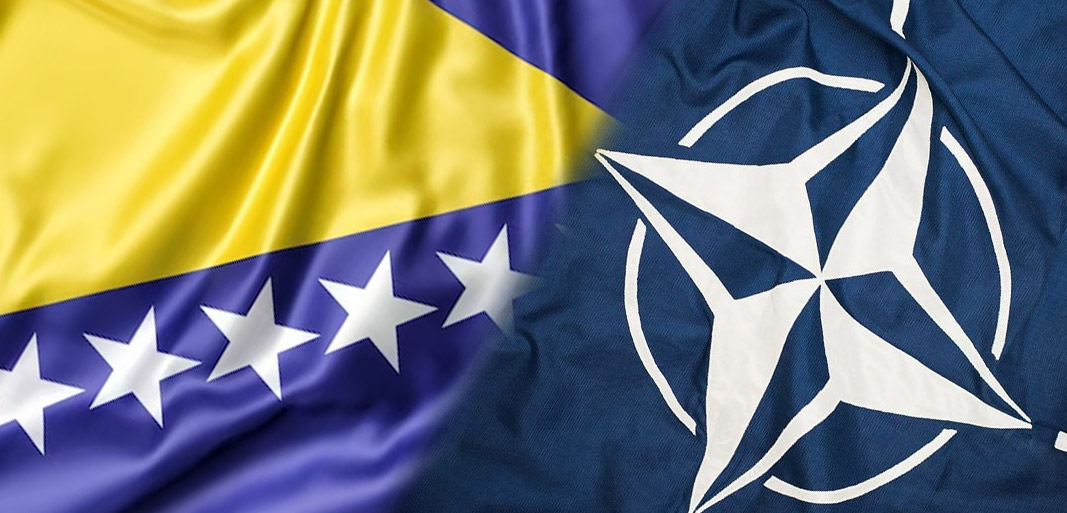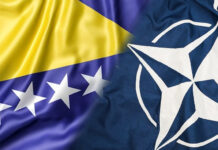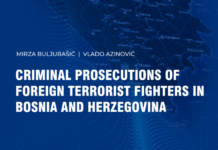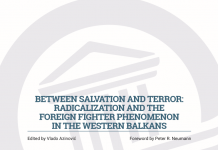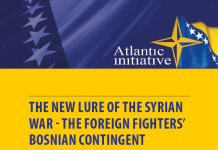By: Sead Turčalo[i]
Contrary to popular assumption, NATO integration could help rather than impede Bosnia and Herzegovina’s path to EU membership. The data shows a more pragmatic stance among the citizens of the country, contradicting the beliefs that only portray NATO integration in a negative or divisive light within the political spheres in Bosnia and Herzegovina. The findings of a survey conducted by the Sarajevo-based think tank Atlantic Initiative show that even Bosnians who are critical of NATO acknowledge the Alliance’s role as a means of achieving bigger objectives, namely EU integration.
Should one venture to query which power those dissenting from Bosnia’s NATO ambitions—particularly within the confines of Republika Srpska—might favor as a strategic ally amongst Russia, China, and NATO, the prevalent discourse within this community suggests a predilection for Russia. But further inquiry suggests that popular attitudes in the RS are more nuanced than the hardline views of their leadership.
In a study published in February 2024 by the Atlantic Initiative, we found that a remarkable 39.7% of those within Republika Srpska who express reservations about Bosnia and Herzegovina’s accession to NATO, paradoxically, cast their lot with NATO as their preferred strategic ally over both Russia and China. This intriguing divergence between perceived public sentiment and the quantifiable preferences of the populace underscores the complexities and often misunderstood undercurrents shaping the geopolitical orientations within the country. And among respondents in the Republika Srpska, where opposition to NATO integration is the highest, the most common response to the question of how NATO membership would benefit Bosnia and Herzegovina – offered by one-fifth (20.6%) of respondents – was that it would bring the country closer to membership in the EU.
These findings are only a few of the numerous indications that domestic and international political actors are seriously misguided in believing that Bosnia and Herzegovina’s chances of becoming a member of the EU are intrinsically jeopardized by the NATO integration process. It seems that the reverse is true, since a sizable portion of Bosnians, including those in the Republika Srpska, understand the connections between these two processes and the possible benefits of NATO membership for advancing Bosnia’s EU aspirations. Policymakers in Bosnia and Herzegovina should also understand that these processes are deeply intertwined, no matter how insistently voices from within the international community declare otherwise.
The historical tapestry of European integration lends credence to this profound interconnection. With the notable exceptions of Spain—a country whose unique historical and geopolitical trajectory renders it an outlier—and those nations whose stances of neutrality were either a matter of principle or imposed upon them, the roadmap to EU membership has invariably wound through the halls of NATO. This historical precedent underscores the fallacy of attempting to disentangle the threads of NATO and EU integration, illustrating that for Bosnia and Herzegovina, as virtually all EU candidates before it, the path towards European integration is one that is both fortified and illuminated by the beacon of NATO membership.
Furthermore, context matters. The geopolitical earthquake that has shaken Europe since the Russian aggression on Ukraine began in February 2022 cannot be ignored. By joining NATO, Finland and Sweden have completely reversed their strategic course. If even highly developed states with decades-long security partnerships with NATO such as Finland and Sweden felt the need to upgrade their commitments to formal membership in the bloc, then the necessity of the same course is obvious for Bosnia and Herzegovina.
Geopolitical developments have already pushed the EU to advance BiH towards candidate and negotiation status in rapid sequence. And NATO has also made it clear that Bosnia and Herzegovina should receive tailored support towards eventual integration, as a means of realizing the strategic direction adopted by the Alliance in its 360-degree approach to security. This strategy aims to “deter, defend, contest and deny across all domains and directions,” as outlined in the NATO Strategic Concept for 2022, keeping Russian aggression in mind. It is imperative for pro-Bosnian politicians to make the most of this geopolitical window of opportunity, as it could close as early as next year.
The integration process of Bosnia and Herzegovina into NATO is intrinsically linked to its EU accession journey, with the former serving as a crucial foundation without which the latter’s potential benefits cannot be fully realized. Also recall Bosnia and Herzegovina’s journey towards NATO against its odyssey with the European Union. Rewinding to the aftermath of the 2010 NATO Summit in Tallinn, we find Bosnia and Herzegovina perched at a crossroads remarkably akin to our current juncture with the European Union. In the Tallinn echoes, we were beckoned to submit our Annual National Program (ANP) and activate the Membership Action Plan (MAP)—a call contingent upon the registration of prospective military property to the state, an edict known as the “Tallinn condition”. The ANP fundamentally reflects the EU’s National Program for the Adoption of the Acquis Communautaire, emphasizing the conditions that, while not new, were most recently underscored by the European Commission in October 2022 as prerequisites for Bosnia and Herzegovina to progress towards the negotiation framework.
Fast forward eight years from Tallinn’s decree, NATO, in a gesture of flexibility and adaptation, invited Bosnia and Herzegovina to proceed with the ANP submission, sidestepping the complete registration of military assets. This pivotal moment signifies not only NATO’s willingness to recalibrate its criteria but also mirrors a parallel flexibility within the EU’s integration protocol, albeit after considerable delays and the stalling of progress due to stringent, unmet prerequisites.
In 2019, Bosnia and Herzegovina’s submission of its inaugural ANP, diplomatically branded as the Reform Program, activated the MAP, propelling us into a preparatory orbit for NATO membership. This phase of reform, were it to be translated into the lexicon of EU integrations, would equate to the initiation of work on reform clusters—a phase that, in the EU context, commences with the opening of the first negotiating cluster. The notable distinction here lies in NATO’s streamlined process, devoid of the formal negotiations that characterize EU integrations, positioning Bosnia and Herzegovina a strategic step ahead in its NATO journey as opposed to its EU aspirations.
Except for the last step—the formal invitation to join—it is evident that NATO has successfully traversed most of the necessary political turning points for Bosnia and Herzegovina’s membership as seen through the lens of political decision-making.
To abandon, set aside, or even decelerate the NATO accession process therefore makes no sense, and will not make European integration more feasible. Instead, given public opinion, the country’s historical experiences, and the current geopolitical circumstances, it is time for Bosnian political authorities to re-engage in dialogue on Euro-Atlantic integrations, to frame them as two streams merged into one, and to elevate this issue as a vital interest of the state. This will require the government and opposition to join together, pushing beyond the country’s extreme political polarization, in a strategic commitment to the existence of Bosnia and Herzegovina itself and to its membership in the Euro-Atlantic bloc.
Such a mandate arises from Bosnian citizens themselves, a majority of whom expressed support for membership in both NATO (69.1%) and the EU (73.3%) in the Atlantic Initiative’s recent survey. What this and other public opinion polling indicates is that Bosnians understand the strategic importance of NATO, even if they are skeptical of the Alliance for other reasons. This suggests that many citizens in Bosnia and Herzegovina have grappled with this question as a matter of national interest, and have weighed the benefits of protecting that interest, as well as the consequences of failing to do so. This speaks to the fact that national interests are not merely expressions of domestic values but are regional and international as well, existing and emerging where the material and moral intersect with security.
It is through this lens that difficult decisions concerning security, rule of law, and national welfare should be made. These decisions are inevitable and may be controversial, but when they are decided in the long-term interest of a state, they represent more than a passing phase of governance. At this geopolitical moment, and looking ahead, it is in the national interest of Bosnia and Herzegovina to merge the country’s NATO and EU integrations. A combined process that is deliberate and strategic has the potential to enable a more successful and comprehensive integration of Bosnia and Herzegovina into both of these Euro-Atlantic structures, whereas neglecting one of these processes will not help or expedite the other and will only slow the progress of Bosnian accession overall.
[i] Author is vice-President of Sarajevo-based think tank Atlantic Initiative, and Associate Professor and the Dean of the University of Sarajevo – Faculty of Political Sciences


